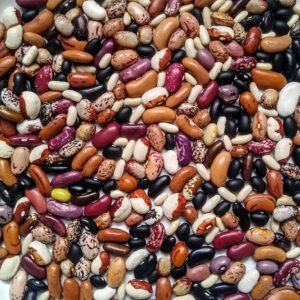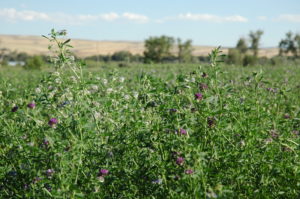
Comment online at Regulations.gov.
Send comments via postal mail to: Docket No. APHIS-2013-0047, Regulatory Analysis and Development, PPD, APHIS, Station, 3A-03.8, 4700 River Road Unit 118, Riverdale, MD 20737-1238
Farmers and handlers, if you would like to send an anonymous comment outlining your experiences with contamination, go to this link. The National Organic Coalition will take your comment from this site and include it as text in their comments submitted to the docket. If you have any questions about this process or its anonymity, please call Liana Hoodes at (914) 443-5759.
Background
In 2011, USDA re-convened the Advisory Committee on Biotechnology and 21st Century Agriculture (AC21) following its highly controversial approval of genetically engineered (GE) alfalfa. AC21 members were charged with providing recommendations on the idea of “coexistence,” including an appropriate compensation mechanism for dealing with economic harm caused by GE contamination. Last year AC21 members provided Secretary Vilsack with their final recommendations in the areas of (1) compensation, (2) stewardship, (3) education and outreach, (4) research, and (5) seed quality. A public comment period is now open to solicit feedback on these recommendations.
Access all AC21 documents here and read the full recommendations here.
Read OSA’s past comments here and here.
Why is this comment period important?
Non-GMO agriculture has shouldered the burden of contamination for too long. This is our opportunity to tell USDA that it must use its authority to (1) implement mandatory contamination prevention measures to avoid the problem and protect the organic and non-GMO sector, and (2) ensure shared responsibility for the unwanted spread of GE products, including a fair compensation mechanism that does not further burden those who avoid, and sometimes are harmed by, contamination.
What information is USDA seeking as part of this comment period?
USDA is asking for input on more than a dozen questions under the topics of education, collaboration, and outreach. View the questions here. The department seeks input on coexistence practices, and, specifically, how the department can support communication between farmers. Yet true coexistence isn’t possible, and by focusing on “coexistence” USDA is skirting the most important question at hand: How do we prevent contamination? Communication between neighboring farmers is a good thing, but communication alone is not a viable solution to the complicated contamination issues at hand. USDA’s questions miss this point.
What should I say in my comments?
Have a story to share?
- If you are a farmer or handler, please consider sharing any experiences you’ve had with contamination on your farm or as a buyer. If you’ve been directly impacted by contamination, please explain the circumstances and consequences in your comments. Several AC21 members have stated that they don’t believe contamination is a problem. Remember, you can submit an anonymous comment here.
- Even if you haven’t experienced contamination, are you spending resources to prevent contamination (e.g., land for buffers, choosing not to grow crops that are at risk, etc.)? What is this costing you?
USDA must establish mandatory measures to prevent contamination
- USDA is missing the point with this comment period. The department wants input on “education” efforts, yet education does not prevent contamination. Voluntary solutions on this issue are insufficient — it’s what we have now and it isn’t working.
- USDA must use its authority to prevent GMO contamination and to compensate contaminated farmers and other businesses impacted. USDA must establish a set of mandated best practices to prevent GE contamination by all farmers who use GE seed and require these farmers and manufacturers to institute concrete contamination prevention measures on their farms to supplement those already being used by organic and other non-GMO producers.
USDA must establish shared responsibility
- Those who own and grow GMOs are currently not required to prevent contamination in the field and marketplace.
- Farmers who avoid GMOs continue to shoulder the entire burden of contamination prevention and clean-up, and at times give up growing certain crops. Planting GMOs must not in any way preclude the growing of organic or other non-GMO crops.
- We know pollen can travel long distances, and we know contamination is happening, as reported by seed companies, farmers, grain buyers, and food manufacturers. We also know that these farmers and businesses are not publicly announcing problems with contamination because they don’t want to risk their reputation and markets.
- Organic agriculture is especially vulnerable because it loses market value when contamination happens. USDA needs to develop mandatory rules to prevent contamination.
USDA should conduct more research to ensure a non-GMO seed supply
- If USDA is going to educate the agricultural community, it should learn more about the impacts of GE products and monitor contamination in the seed supply.
- USDA should immediately create a GE contamination registry so it can track and eliminate known sources of GE contamination across the supply chain.
USDA should reject AC21’s compensation proposal
- AC21 recommends that farmers buy crop insurance to protect themselves against unwanted GMO contamination. This is simply unacceptable. It would unfairly require organic and other non-GMO producers to spend even more money to protect themselves while GMO manufacturers would completely escape liability for GMO contamination prevention and compensation.
- The patent holders of GMO products should be responsible for segregation and traceability, from seed to plate. Those who own, promote, and profit from GMO products should be held responsible for the economic and market harm their products cause.
Are there any good proposals in AC21’s recommendations?
- AC21’s recommendations included some good proposals for research and seed quality. Tell USDA to implement these recommendations immediately:
- USDA should conduct research to ensure there is an adequate supply of improved non-GMO seed that meets the diverse and local needs of farmers.
- USDA should ensure the continued work of the National Genetic Resources Advisory Council (NGRAC).
- USDA should create and implement a plan to maintain the purity of publicly held germplasm. The plan should include measures to (1) determine the presence of GE traits in publicly held germplasm stocks, (2) conduct ongoing monitoring of contamination in germplasm stocks, and (3) address contamination if it is identified in germplasm stocks.
- USDA should also conduct research on the state of contamination in the commercial, non-GMO seed supply.

